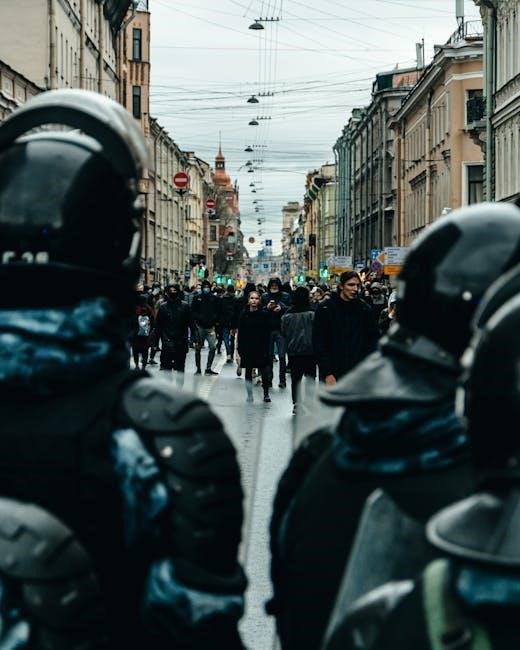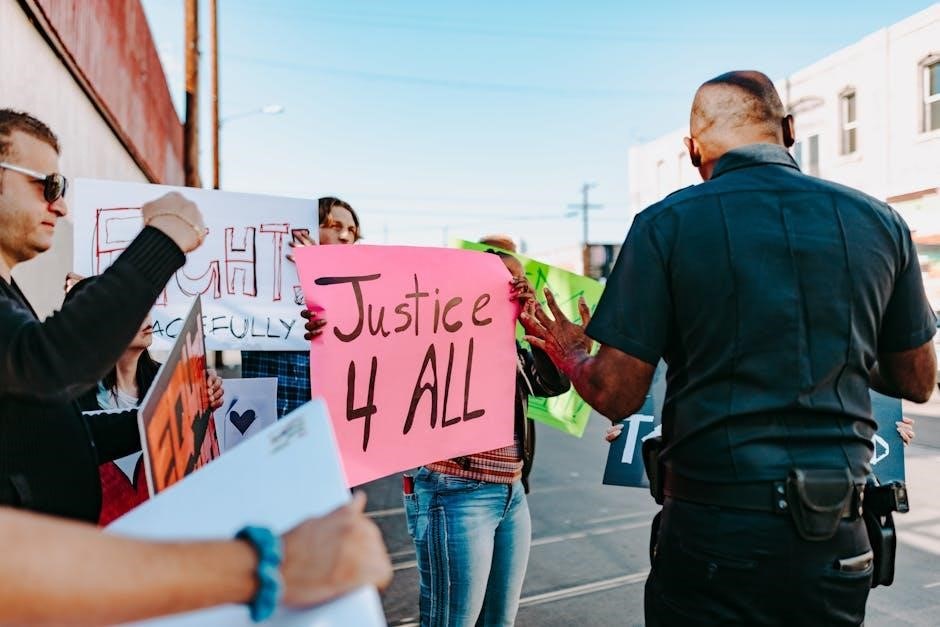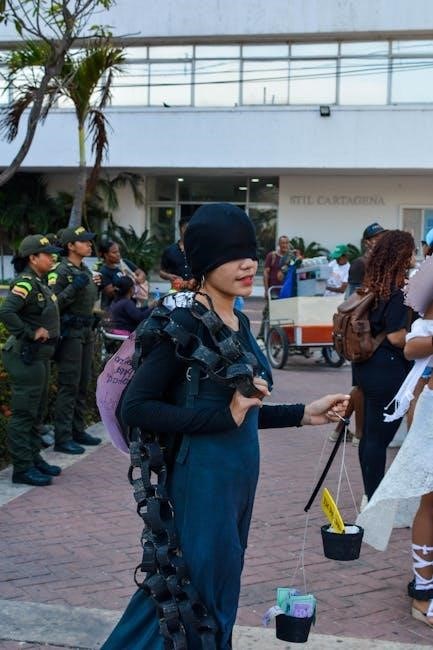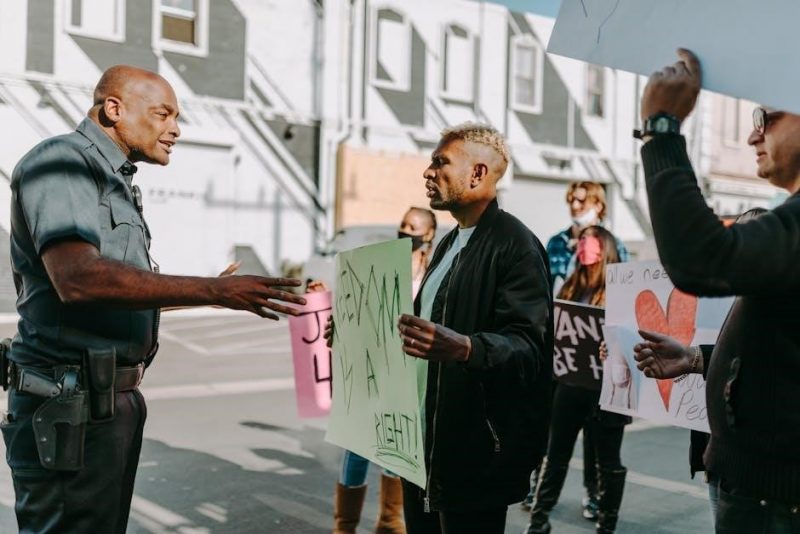rights police don’t want you to know pdf
Discover the shocking truth about police rights they don't want exposed. Get the inside scoop and protect yourself today!
Understanding your rights during police interactions is vital for protecting your freedoms and ensuring fair treatment. Knowing when police can stop or search you, and your right to remain silent, empowers you to navigate such situations confidently.
The Importance of Understanding Your Rights
Understanding your rights when interacting with law enforcement is crucial for protecting your freedoms and ensuring fair treatment. Many individuals are unaware of their legal protections, which can lead to unintended consequences. Knowing when police can legally stop or search you, and your right to remain silent, empowers you to navigate such situations confidently. Without this knowledge, you may unknowingly consent to actions that could compromise your rights. Staying informed about your rights fosters trust between communities and law enforcement, ensuring accountability and justice. It’s essential to educate yourself on these matters to avoid misunderstandings and potential violations of your rights.
Overview of Key Rights Often Overlooked
Several critical rights are often overlooked during police interactions, leaving individuals vulnerable to potential violations. One key right is the ability to remain silent, as anything said can be used as evidence. Additionally, you have the right to refuse a search without a warrant, though police may still conduct a pat-down for weapons. Another overlooked right is the ability to ask for identification to confirm the officer’s authority. Miranda rights, which protect against self-incrimination, are also frequently misunderstood. Lastly, racial disparities in policing highlight the importance of understanding these rights to ensure fair treatment. Knowing these rights empowers individuals to navigate interactions with law enforcement more effectively and confidently, safeguarding their freedoms and promoting accountability.
Police Stops and Searches
Police stops and searches are governed by specific legal standards. Officers must have reasonable suspicion for a stop and probable cause or consent for a search. Your rights include refusing a search without a warrant and asking for identification to confirm the officer’s authority. Understanding these boundaries helps protect your freedoms during interactions with law enforcement.
When Police Can Stop You
Police can stop you if they have reasonable suspicion that you are involved in criminal activity. This standard is lower than probable cause but requires more than a mere hunch. Officers must articulate specific facts or observations that justify the stop. For example, matching a suspect description or behaving suspiciously in a high-crime area. However, they cannot stop you based on race, ethnicity, or other biased reasons. If stopped, you have the right to ask for identification to confirm the officer’s authority. Staying calm and cooperative is crucial, but you are not obligated to answer detailed questions. Remember, your rights are protected under the law, and understanding these boundaries can help ensure fair treatment during police interactions.
Your Right to Refuse a Search
Your right to refuse a search is a fundamental aspect of protecting your privacy. Police cannot search you, your belongings, or your vehicle without either a warrant or your consent. If an officer asks to search, you can politely decline by saying, “I do not consent to this search.” Refusing a search does not imply guilt; it merely upholds your legal rights. However, officers may still conduct a pat-down if they reasonably believe you possess a weapon. Always stay calm and assertive when exercising this right. Remember, refusing a search can prevent unintended legal consequences and safeguard your personal freedoms; Knowing and asserting this right can help protect you during interactions with law enforcement.
Your Rights During an Arrest
During an arrest, you have the right to remain silent and request an attorney. Police must inform you of these rights through Miranda warnings. Resisting arrest can lead to additional charges, so it’s crucial to cooperate while asserting your rights. Remember, anything you say can be used against you in court. Always ask for legal representation and avoid discussing your case without counsel present. Knowing your rights during this process can help protect your freedoms and ensure fair treatment under the law.
The Right to Remain Silent
The right to remain silent is a fundamental protection under the Fifth Amendment, shielding you from self-incrimination. When interacting with law enforcement, you are not obligated to answer questions beyond providing basic identification. Police may not explicitly inform you of this right unless you are in custody. Exercising silence can prevent unintended legal consequences, as any statement made can be used against you in court. It is advisable to politely decline to answer questions and request an attorney. This right is crucial in maintaining your legal safeguards and ensuring that your interactions with law enforcement remain fair and just.
Understanding Miranda Rights
Miranda Rights are a set of protections read to individuals upon arrest, ensuring they understand their right to remain silent and seek legal counsel. These rights, derived from the Miranda v. Arizona case, are designed to prevent coerced confessions. Police are required to recite Miranda Rights when taking someone into custody, stating that anything said can be used against them in court. Importantly, Miranda Rights do not apply during casual stops or questioning—only when under arrest. Remaining silent is a powerful tool to avoid self-incrimination, and requesting an attorney halts further questioning. Knowing these rights empowers individuals to protect themselves during police interactions, ensuring fairness and adherence to legal standards. Awareness of Miranda Rights is essential for safeguarding personal freedoms and understanding one’s legal protections.

Search and Seizure Laws

Search and seizure laws require police to obtain warrants, typically executed during daylight hours, unless exigent circumstances exist, ensuring your property is protected from unreasonable searches.
What Constitutes a Legal Search
A legal search requires a warrant, which must specify the items or areas to be searched and be based on probable cause. Police must obtain judicial approval to ensure the search is reasonable. Warrants are typically executed during daylight hours (6am to 10pm) unless exigent circumstances exist. Without a warrant, police can only search if you consent, which you have the right to refuse. Officers may conduct a pat-down for weapons if they suspect you are armed. Evidence obtained illegally cannot be used in court, protecting your rights. Understanding these guidelines helps ensure searches are conducted lawfully and respectfully.
Police Entry into Your Home Without a Warrant
Police entry into your home without a warrant is generally illegal unless specific exceptions apply. Officers must typically obtain a warrant based on probable cause to search private property. However, exceptions exist, such as in emergencies, hot pursuit of a suspect, or if evidence is at risk of destruction. Consent also allows police to enter without a warrant. If police enter without justification, the search may be deemed unlawful, and evidence obtained could be excluded from court. Always ask to see a warrant before allowing entry and verify the officer’s identity to ensure they are acting lawfully. Knowing these boundaries protects your constitutional rights.

Police Discretion and Ethics
Police officers must balance discretion with ethical frameworks, ensuring fair treatment and protection of all individuals’ rights during their duties, upholding justice and community trust.
Police Officers’ Duty to Protect and Serve
Police officers are sworn to protect and serve the community, ensuring public safety and upholding the law. Their duty requires balancing authority with ethical conduct, respecting individual rights, and avoiding excessive force. They must act impartially, applying the law equally to all, without discrimination. Officers are also expected to assist those in need, provide support during emergencies, and engage with the community to build trust. Understanding their role helps citizens recognize when actions align with their duties or overstep legal boundaries, ensuring accountability and fostering a safer environment for everyone.
Ethical Policing and Decision-Making
Ethical policing and decision-making are crucial for maintaining trust between law enforcement and the public. Officers must adhere to a code of ethics, ensuring their actions are fair, transparent, and respectful of individual rights. They face complex situations where quick decisions can impact lives, requiring a balance between legal obligations and moral judgment. Ethical frameworks guide officers to prioritize de-escalation, avoid bias, and use force only when necessary. Continuous training and accountability measures help uphold these standards, fostering integrity and public confidence in policing practices. Ethical decision-making not only protects citizens but also upholds the legitimacy of law enforcement as a whole.

Special Considerations for Vulnerable Groups
Vulnerable groups, including racial minorities, often face disproportionate policing. Black individuals are six times more likely to be searched, highlighting systemic disparities. The 14th Amendment mandates equal protection, but biases persist, requiring advocacy to safeguard rights and ensure fair treatment. Police must address these inequities to uphold justice and trust within marginalized communities. Awareness and reform are essential to prevent discrimination and protect the rights of all individuals equally.
Racial Disparities in Policing
Racial disparities in policing are a significant concern, with Black individuals being six times more likely to be searched than others. These disparities often stem from systemic biases and unfair targeting. The Fourteenth Amendment requires equal protection under the law, yet such inequalities persist. Police officers must be trained to recognize and overcome implicit biases to ensure fair treatment. Communities of color frequently report feeling over-policed, which erodes trust in law enforcement. Addressing these issues requires transparency, accountability, and systemic reform to ensure all individuals are treated equally and justly. Advocacy and education are crucial to combating racial profiling and fostering trust between law enforcement and marginalized communities.
Protecting the Rights of Protesters
Protesters have the right to peaceful assembly and free expression, protected by law. Police must balance public safety with these rights, ensuring non-violent demonstrations are not disrupted. Officers should avoid excessive force and respect protesters’ anonymity, as asking for identification without cause is often unlawful. Recording interactions with law enforcement is a powerful tool for accountability. Protesters should remain informed about their rights and seek legal advice if violated. Transparency and dialogue between police and communities are essential to de-escalate tensions and uphold justice, fostering a safe environment for lawful protests. Knowing and asserting these rights helps protect against unjust treatment during demonstrations.
Stay calm, know your rights, and politely ask for identification. Always remain silent and record interactions for accountability. These practices protect your rights and ensure transparency.
How to Safely Interact with Law Enforcement
When interacting with police, remain calm and respectful. Always ask for identification to confirm the officer’s identity. Politely refuse unnecessary searches and request a warrant if demanded. Stay silent and avoid explaining your situation unless necessary. Recording the interaction can provide accountability, but ensure it’s done legally. Avoid sudden movements and follow clear instructions. If arrested, exercise your right to remain silent and seek legal assistance promptly. Understanding your rights empowers you to navigate such encounters confidently while ensuring transparency and fairness. Awareness of these practices fosters safer interactions and protects your legal entitlements.
The Role of Community Awareness in Protecting Rights
Community awareness plays a vital role in protecting individual rights, especially during interactions with law enforcement. Educating citizens about their legal entitlements fosters a safer and more informed society. By organizing workshops, campaigns, and online resources, communities can empower individuals to understand their rights and how to assert them respectfully. Sharing knowledge about police procedures and legal protections ensures that everyone, particularly vulnerable groups, can navigate encounters with confidence. Additionally, encouraging open dialogue between communities and law enforcement helps build trust and accountability. Collective awareness not only safeguards personal freedoms but also promotes a culture of mutual respect and understanding, ultimately creating a more just and equitable society for all.

